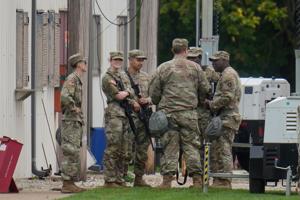
News
October 08, 2025
Texas National Guard in Illinois as tensions escalate
National Guard members from Texas are at an Army training center in Illinois. It's the most visible sign yet of the Trump administration’s plan to deploy troops to the Chicago area despite a lawsuit and vigorous opposition from Democratic elected...
Texas National Guard members have arrived at an Army training center in Illinois, marking a significant escalation in the Trump administration's controversial plan to deploy federal troops to the Chicago area. The deployment, intended to bolster local law enforcement, has been met with staunch opposition from Democratic elected officials and is currently facing a legal challenge.
The presence of the Texas National Guard, now stationed at the undisclosed training facility, represents the most visible manifestation of the administration's intent to proceed despite the mounting resistance. Details surrounding the specific mission and operational parameters of the National Guard unit remain scarce, fueling further anxieties among local leaders and community members.
Opponents of the deployment argue that sending federal troops to Chicago is an overreach of federal power and an unnecessary militarization of the city. They express concerns that the presence of armed military personnel could escalate tensions, particularly in communities already grappling with issues of policing and social justice. Critics also point to the potential for the deployment to be used for political purposes, especially in the lead-up to a national election.
The lawsuit filed against the Trump administration seeks to block the deployment, arguing that it violates constitutional principles and infringes upon the rights of Illinois residents. The legal challenge asserts that the federal government lacks the authority to unilaterally deploy troops to a state without the consent of the governor.
While the administration maintains that the deployment is necessary to combat violent crime and support local law enforcement efforts, Democratic leaders in Illinois remain unconvinced. They argue that the city and state have the resources and capabilities to address crime effectively, and that federal assistance should be focused on providing resources and support, rather than deploying troops.
The arrival of the Texas National Guard in Illinois underscores the deep divisions surrounding the role of the federal government in local law enforcement. As the legal battle unfolds and the National Guard unit prepares for its mission, the situation in Chicago remains highly charged, with the potential for further escalation and conflict. The deployment is being closely watched as a test of federal power and a reflection of the growing polarization in American politics.
The presence of the Texas National Guard, now stationed at the undisclosed training facility, represents the most visible manifestation of the administration's intent to proceed despite the mounting resistance. Details surrounding the specific mission and operational parameters of the National Guard unit remain scarce, fueling further anxieties among local leaders and community members.
Opponents of the deployment argue that sending federal troops to Chicago is an overreach of federal power and an unnecessary militarization of the city. They express concerns that the presence of armed military personnel could escalate tensions, particularly in communities already grappling with issues of policing and social justice. Critics also point to the potential for the deployment to be used for political purposes, especially in the lead-up to a national election.
The lawsuit filed against the Trump administration seeks to block the deployment, arguing that it violates constitutional principles and infringes upon the rights of Illinois residents. The legal challenge asserts that the federal government lacks the authority to unilaterally deploy troops to a state without the consent of the governor.
While the administration maintains that the deployment is necessary to combat violent crime and support local law enforcement efforts, Democratic leaders in Illinois remain unconvinced. They argue that the city and state have the resources and capabilities to address crime effectively, and that federal assistance should be focused on providing resources and support, rather than deploying troops.
The arrival of the Texas National Guard in Illinois underscores the deep divisions surrounding the role of the federal government in local law enforcement. As the legal battle unfolds and the National Guard unit prepares for its mission, the situation in Chicago remains highly charged, with the potential for further escalation and conflict. The deployment is being closely watched as a test of federal power and a reflection of the growing polarization in American politics.
Category:
World